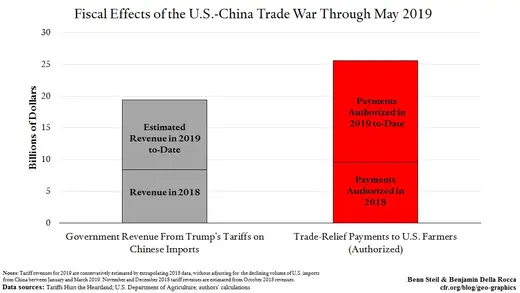By experts and staff
- Published
Experts
![]() By Benn SteilSenior Fellow and Director of International Economics
By Benn SteilSenior Fellow and Director of International Economics
By
- Benjamin Della RoccaAnalyst, Center for Geoeconomic Studies

“I am very happy with over $100 Billion a year in Tariffs filling U.S. coffers,” tweeted President Trump this month. This money is “great for U.S., not good for China!”
The President’s accounting is, unfortunately, way off. First, his China tariffs last year netted the government less than a tenth of what he claims. Second, those tariffs were not paid by China, but by American companies importing Chinese goods—much of them components needed to manufacture products in the United States.
Yet as we pointed out last December, Trump’s tariff claims have a bigger flaw. In 2018, the U.S. government committed to paying American farmers $9.6 billion to offset their losses from Chinese tariff retaliation. This is about $1 billion more than it took in all year from Trump’s China tariffs. Tariffs, therefore, ending up not just harming American companies and consumers, but costing the government money. More money left “U.S. coffers” to offset farm losses than came into them from U.S. importers.
We also predicted that, with farmers a critical part of Trump’s electoral base, these losses would grow as the trade war dragged on. And we were right.
Since last year, as the graphic above shows, Trump’s “tariff deficit” has only ballooned further. The Department of Agriculture just unveiled a new $16 billion bailout for farmers hit by the trade war. After just ten months of a trade war with China, subsidies to farmers are set to drain over $25 billion from “U.S. coffers” for damage done to date. China tariffs, meanwhile, have so far brought in just over $19 billion in tax payments from U.S. importers—$6 billion less than authorized farmer payments.
Going forward, Trump’s tariff deficit shows no sign of shrinking—quite the reverse. Just this week, China announced it will, once again, halt purchases of U.S. soybeans—a move that will further devastate the U.S. farm sector. This move, in turn, is likely to trigger further farm bailouts.
If, as the president claimed in 2018, “trade wars are good, and easy to win,” this one is being badly generaled.
